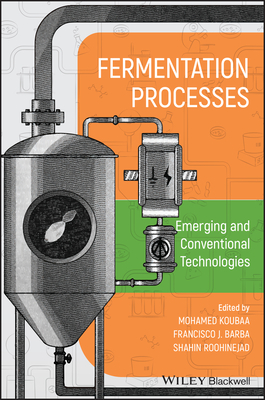Dispersity, Structure and Phase Changes of Proteins and Bio Agglomerates in Biotechnological Processes
暫譯: 生物技術過程中蛋白質與生物聚集體的分散性、結構及相變化
Kwade, Arno, Kampen, Ingo
- 出版商: Springer
- 出版日期: 2024-09-27
- 售價: $10,160
- 貴賓價: 9.5 折 $9,652
- 語言: 英文
- 頁數: 520
- 裝訂: Hardcover - also called cloth, retail trade, or trade
- ISBN: 3031631633
- ISBN-13: 9783031631634
-
相關分類:
材料科學 Meterials
海外代購書籍(需單獨結帳)
相關主題
商品描述
This book serves as a comprehensive summary of the priority program SPP 1934, which focused on understanding the dispersity, structure, and phase changes of proteins and bio-agglomerates in biotechnological processes. Through contributions from various research groups, the program explored how sensitive proteins and bio-agglomerates are affected by the process environment during fermentation, downstream processing, and formulation. It investigated these effects across three size scales: microscale, encompassing single proteins, clusters, crystals, and virus-like particles; mesoscale, focusing on cells and cell clusters; and macroscale, examining overall process dynamics. The main objective was to enhance biotechnological process chains by elucidating the mechanical, thermal, and chemical stresses that impact protein and bio-agglomerate structures. By gaining insights into these stressors, the program aimed to enable precise control measures to mitigate denaturation and unfavorable growth of proteins and cells. This compilation seeks to contribute to the optimization of biotechnological processes, facilitating advancements in various industries.
商品描述(中文翻譯)
本書作為優先計畫 SPP 1934 的綜合總結,專注於理解生物技術過程中蛋白質和生物聚集體的分散性、結構及相變化。透過各研究團隊的貢獻,該計畫探討了在發酵、下游處理和配方過程中,敏感的蛋白質和生物聚集體如何受到過程環境的影響。研究涵蓋了三個尺寸尺度的影響:微觀尺度,包含單一蛋白質、聚集體、晶體及類病毒顆粒;中觀尺度,專注於細胞及細胞聚集體;以及宏觀尺度,檢視整體過程動態。主要目標是通過闡明影響蛋白質和生物聚集體結構的機械、熱和化學壓力,來增強生物技術過程鏈。透過對這些壓力源的深入了解,該計畫旨在實現精確的控制措施,以減少蛋白質和細胞的變性及不利生長。本書的編纂旨在促進生物技術過程的優化,推動各行業的進步。
作者簡介
Prof. Dr.-Ing. Arno Kwade (Technische Universität Braunschweig) worked 9 years as a process engineer in leading industrial positions after finishing his doctorate in 1996. In 2005, he was appointed as Professor and Director of the Institute for Particle Technology (iPAT) at Technische Universität Braunschweig. Today at TU Braunschweig he is Vice President for Transfer and Innovation and spokesperson of the interdisciplinary research centres Battery LabFactory Braunschweig (BLB) and Center of Pharmaceutical Engineering (PVZ). Moreover, he is vice chairman of BMBF advisory board Battery Research Germany, coordinator of BMBF competency cluster for battery cell production (ProZell) and member of Fraunhofer Institute for Thin Films (IST). His research focus lies on developing deep knowledge, process-structure-property relationships and numerical simulations for processes in which particles are mechanically stressed and formulated, from milling and mechanochemical synthesis over mixing and powder handling and characterization to production of drug and bio products and battery electrodes. He received awards like the Lower Saxony Science Award in 2021 and Hans Rumpf medal in 2022. Together with colleagues he published nearly 500 papers which are cited more than 12,000 times.
Dr.-Ing. Ingo Kampen (Technische Universität Braunschweig) studied biotechnology before completing his doctoral thesis in the field of protein purification in 2005. He then became head of the pharmaceutical and bioparticle technology department at the Institute for Particle Technology (iPAT), where he still works today. His main field of work is the measurement of micromechanical properties of biological particles such as cross-linked protein crystals or individual cells in order to better understand their denaturation and damage during use in various processes. He was managing director of the DFG priority programme 1934 'Dispersity, Structure and Phase Changes of Proteins and Bio-Agglomerates in Biotechnological Processes'. He is also heavily involved in teaching and played a key role in the development of the Master's degree programme in Pharmaceutical Process Engineering at Technische Universität Braunschweig.
作者簡介(中文翻譯)
教授、博士工程師 Arno Kwade(布倫瑞克工業大學)在1996年完成博士學位後,曾在領先的工業職位上擔任過9年的過程工程師。2005年,他被任命為布倫瑞克工業大學顆粒技術研究所(iPAT)的教授及所長。如今,他在布倫瑞克工業大學擔任轉移與創新副校長,以及跨學科研究中心電池實驗室(Battery LabFactory Braunschweig, BLB)和製藥工程中心(Center of Pharmaceutical Engineering, PVZ)的發言人。此外,他還是德國聯邦教育與研究部(BMBF)電池研究顧問委員會的副主席,BMBF電池電池生產能力集群(ProZell)的協調員,以及弗勞恩霍夫薄膜研究所(Fraunhofer Institute for Thin Films, IST)的成員。他的研究重點在於開發深層知識、過程-結構-性質關係以及數值模擬,針對機械應力和配方中的顆粒過程,從磨粉和機械化學合成到混合、粉末處理和特性分析,再到藥物和生物產品及電池電極的生產。他曾獲得2021年下薩克森科學獎和2022年漢斯·倫夫獎章等獎項。與同事們一起,他發表了近500篇論文,引用次數超過12,000次。
博士工程師 Ingo Kampen(布倫瑞克工業大學)在2005年完成蛋白質純化領域的博士論文之前,曾學習生物技術。隨後,他成為顆粒技術研究所(iPAT)製藥與生物顆粒技術部門的負責人,至今仍在該部門工作。他的主要工作領域是測量生物顆粒的微機械性質,例如交聯蛋白晶體或單個細胞,以更好地理解它們在各種過程中使用時的變性和損傷。他曾擔任德國研究基金會(DFG)優先計劃1934「生物技術過程中蛋白質和生物聚集體的分散性、結構和相變化」的執行董事。他還積極參與教學,並在布倫瑞克工業大學製藥過程工程碩士學位課程的開發中發揮了關鍵作用。











